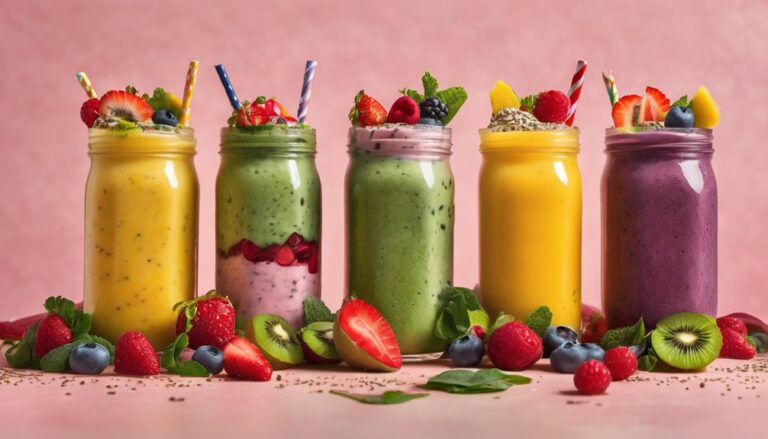How to Break Sugar Addiction
Breaking sugar addiction can feel overwhelming, but understanding the process is the first step. You need to recognize your triggers and how they influence your cravings. By gradually reducing your sugar intake and replacing it with healthier options, you can regain control. It's not just about cutting back; it's about building sustainable habits that last. Discovering effective strategies can make a significant difference in your journey. So, what are the best ways to start?
Key Takeaways
- Identify and acknowledge your triggers, such as stress or boredom, to better manage your cravings for sugar.
- Gradually reduce sugar intake by tracking portions and using sugar substitutes like stevia or monk fruit.
- Incorporate healthy alternatives, like fruit or natural sweeteners, to satisfy your sweet tooth without refined sugars.
- Plan meals in advance and stay hydrated to minimize temptation and maintain fullness throughout the day.
- Seek support from friends or groups to foster accountability and encouragement during your journey to break sugar addiction.
Understanding Sugar Addiction
Understanding sugar addiction is crucial if you want to regain control over your health. Sugar doesn't just satisfy your sweet tooth; it can create biological effects that alter your brain chemistry.
When you consume sugar, your body releases dopamine, leading to feelings of pleasure. Over time, you may find yourself chasing that high, developing a cycle that's hard to break.
Moreover, consider the emotional connections you have with sugar. It often ties to comfort, joy, or even celebration, reinforcing your cravings during tough times.
Recognizing these patterns is the first step to understanding your addiction. By acknowledging both the biological and emotional components, you can start to navigate your relationship with sugar more mindfully, paving the way for healthier choices.
Identifying Your Triggers
What situations or emotions trigger your cravings for sugar? Recognizing these moments is key to breaking free from sugar addiction. Many people find themselves reaching for trigger foods during stress, sadness, or even boredom. Start by keeping a journal to track your cravings, noting the circumstances surrounding them. This can reveal patterns in your emotional eating.
Here's a helpful table to guide you:
| Trigger Situations | Impact on Cravings |
|---|---|
| Stress | Increases cravings |
| Boredom | Leads to mindless snacking |
| Sadness | Comforts temporarily |
| Social Gatherings | Encourages indulgence |
| Fatigue | Lowers willpower |
Gradual Reduction Strategies
Once you've identified your triggers, it's time to implement gradual reduction strategies to combat sugar addiction effectively.
Start by using sugar substitutes, like stevia or monk fruit, to help satisfy your sweet cravings without the same impact on your health.
Gradually reduce your sugar intake by keeping track of your portions. If you usually add two teaspoons of sugar to your coffee, try cutting it to one and a half, then one, and so on.
This slow approach makes adjustments more manageable and less overwhelming. Remember, it's about progress, not perfection.
Celebrate small victories along the way, and don't hesitate to reach out for support when you need it. You're on the right path, and every step counts!
Healthy Alternatives to Sugar
As you seek healthier options to satisfy your sweet tooth, consider exploring natural alternatives to sugar that can enhance your meals and snacks without the negative health effects.
Natural sweeteners like stevia, monk fruit, and honey offer sweetness with fewer calories and a lower glycemic index. They're great for adding to your morning oatmeal or yogurt.
You might also try fruit substitutes, such as ripe bananas or applesauce, which can sweeten recipes while providing fiber and essential nutrients.
These options not only curb your cravings but also support your overall health. By incorporating these alternatives, you can enjoy delicious flavors without the harmful impact of refined sugars.
Embrace this journey; you're making a positive change for your well-being.
Building Long-Term Healthy Habits
While breaking a sugar addiction can feel daunting, building long-term healthy habits is essential for maintaining your progress.
Focus on habit formation and small lifestyle changes that support your goals. Here are three strategies to help you create lasting habits:
- Plan your meals: Preparing healthy meals in advance reduces the temptation to reach for sugary snacks.
- Stay hydrated: Drinking plenty of water can curb cravings and keep you feeling full.
- Seek support: Surround yourself with friends or join groups who share your goals for encouragement and accountability.
Frequently Asked Questions
Can Sugar Addiction Lead to Other Substance Addictions?
Sugar cravings can indeed lead to addictive behaviors. When you rely on sugar for pleasure, it might create a pathway to other substances, as the brain craves similar reward responses. Staying mindful helps you avoid these patterns.
How Long Does It Take to Overcome Sugar Addiction?
Overcoming sugar addiction's like sailing through stormy seas; it takes time and patience. You might feel those sugar cravings fiercely at first, but by steadily reducing intake, you'll find calmer waters in about a few weeks.
Are There Withdrawal Symptoms From Sugar?
Yes, you can experience withdrawal effects from sugar, like headaches or mood swings. These symptoms often accompany sugar cravings as your body adjusts. It's tough, but you're not alone—support and patience can really help.
Is Sugar Addiction Genetic or Environmental?
Sugar addiction can stem from both genetic predisposition and environmental factors. While your genes might influence cravings, your surroundings—like stress and availability of sugary foods—play a significant role in shaping your relationship with sugar.
Can I Still Enjoy Sweets While Overcoming Addiction?
Yes, you can still enjoy sweets while overcoming addiction. Focus on moderation strategies and healthy alternatives. Research shows that balancing indulgence with nutritious options can help you maintain a satisfying relationship with food without feeling deprived.
Conclusion
Breaking sugar addiction is a journey, not a sprint. By understanding your triggers and gradually reducing sugar intake, you can pave the way to healthier habits. Embrace natural alternatives and stay mindful of your choices, as small changes can lead to significant transformations. Remember, every step you take is a victory on the path to wellness. Surround yourself with support, and soon you'll find that the sweet taste of freedom from sugar is more rewarding than any sugary treat.












